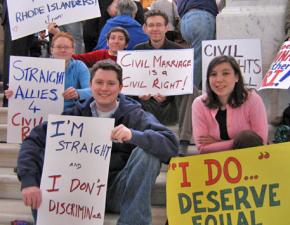R.I. approves equal marriage
reports on a long-awaited victory for marriage equality in Rhode Island.
ON APRIL 24, Rhode Island's Senate approved a bill legalizing same-sex marriage, leaving only the formality of a gubernatorial signature as the final barrier to marriage equality being enshrined across New England.
It has been 16 years since marriage equality was first introduced in the Rhode Island General Assembly, and this is the first time it has been put to an open vote in both the House and Senate. Earlier this year, the House passed its version of the marriage equality bill 51-19. The Senate vote was 26-12.
Public opinion has been firmly on the side of equality in the state since at least 2009, according to a Brown University poll that found that a solid 60 percent of Rhode Islanders support equal marriage. State leaders, however, had always lagged behind the public.
Former Gov. Donald Carcieri had vowed to veto any marriage equality bill that came across his desk, which made even the staunchest advocates hesitant to advocate for a floor vote out of fear that a gubernatorial veto would prove to be demoralizing.

In 2011, with the new, and more sympathetic, Gov. Lincoln Chaffee in office and eager to sign marriage equality into law, openly gay Speaker of the House Gordon Fox announced that he would stop pushing for marriage equality in that legislative session, citing an uncertain Senate led by Patricia Paiva-Weed, an opponent of the bill. What resulted was a civil unions bill wrought with problematic religious exemptions. To date, only 68 Rhode Island couples have taken advantage of civil unions.
LAST YEAR, on the heels of Barack Obama's announcement that he personally supports same-sex marriage, Gov. Chaffee issued an executive order extending recognition of same-sex marriages performed out of state for the purpose of all state institutions. This has gone a long way toward treating same-sex couples with dignity and respect under the law, but has not eliminated the underlying contradiction of having out-of-state marriages recognized while failing to offer full marriage equality to Rhode Island citizens.
Leading up the victory this year, Senate President Teresa Paiva-Weed announced that although she's still opposed to same-sex marriage, she would not stand in the way of putting the bill up for a floor vote in the Senate. Resolutions calling for the passage of equal marriage passed through the city councils of Warwick, East Providence and South Kingstown.
The foundation on which the vocal minority of reactionaries who remained opposed to equality had been able to delay progress fell out from under them. By the time of the final vote, the so-called National Organization for marriage had all but given up fighting to stop marriage equality in the state, and Bishop Thomas Tobin of the diocese of Providence found his opposition out of sync with the majority of Catholics in the state.
Rhode Island now joins its neighbors Massachusetts, Connecticut, New Hampshire, Maine and Vermont, as well as Iowa, New York, Maryland, Washington State, Washington D.C., and three Native American Tribes who now extend marriage rights to all of its citizens.
This hard-won victory owes its success to a tireless movement that has demanded that it be heard. In the last couple of years, the LGBTQ movement has toppled "don't ask, don't tell," gained marriage rights in 10 states and the nation's capital, and forced a sitting president to endorse marriage equality.
Although we celebrate this victory today, our work is far from over. We will settle for nothing less than full equality across the U.S. and beyond!


